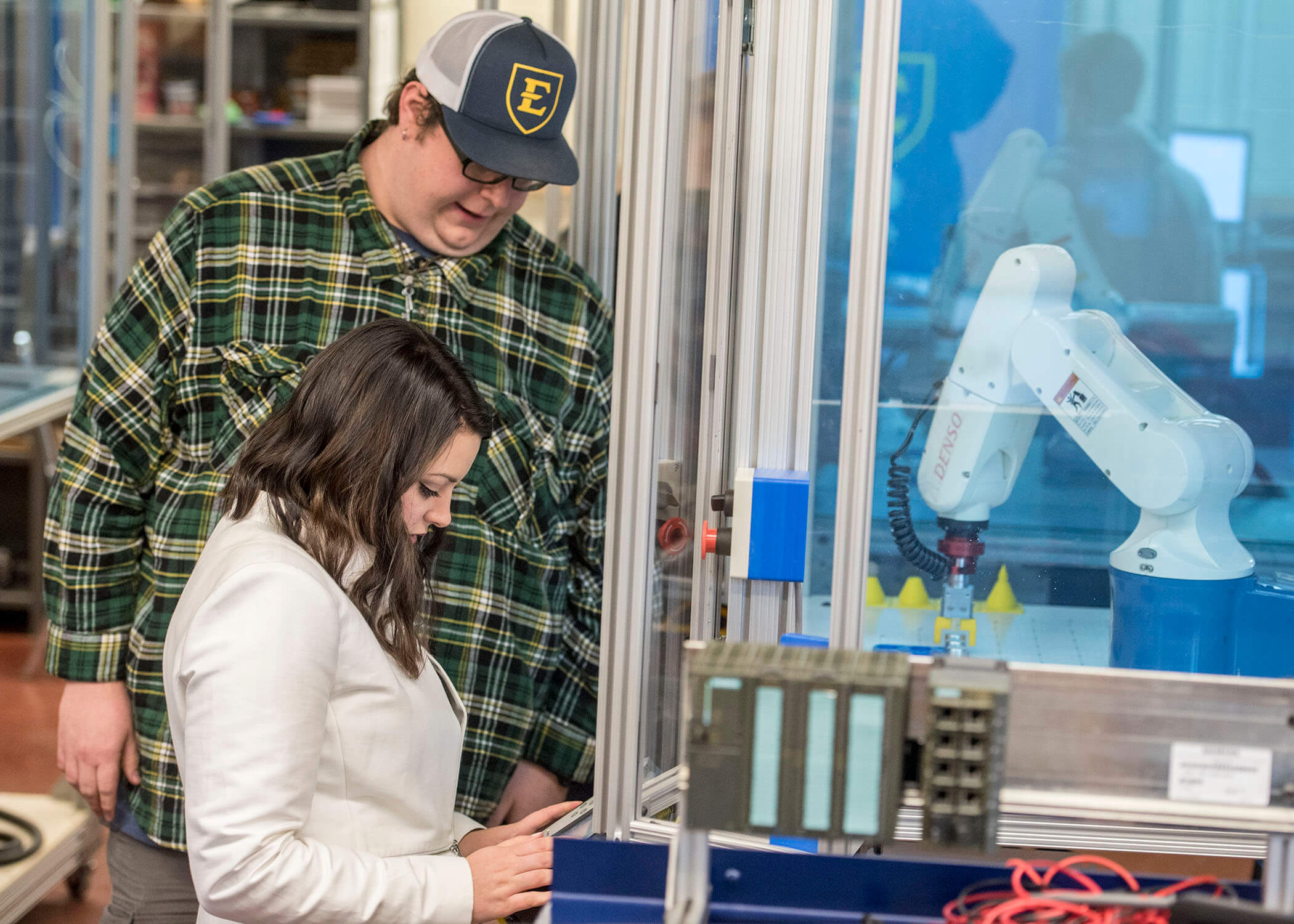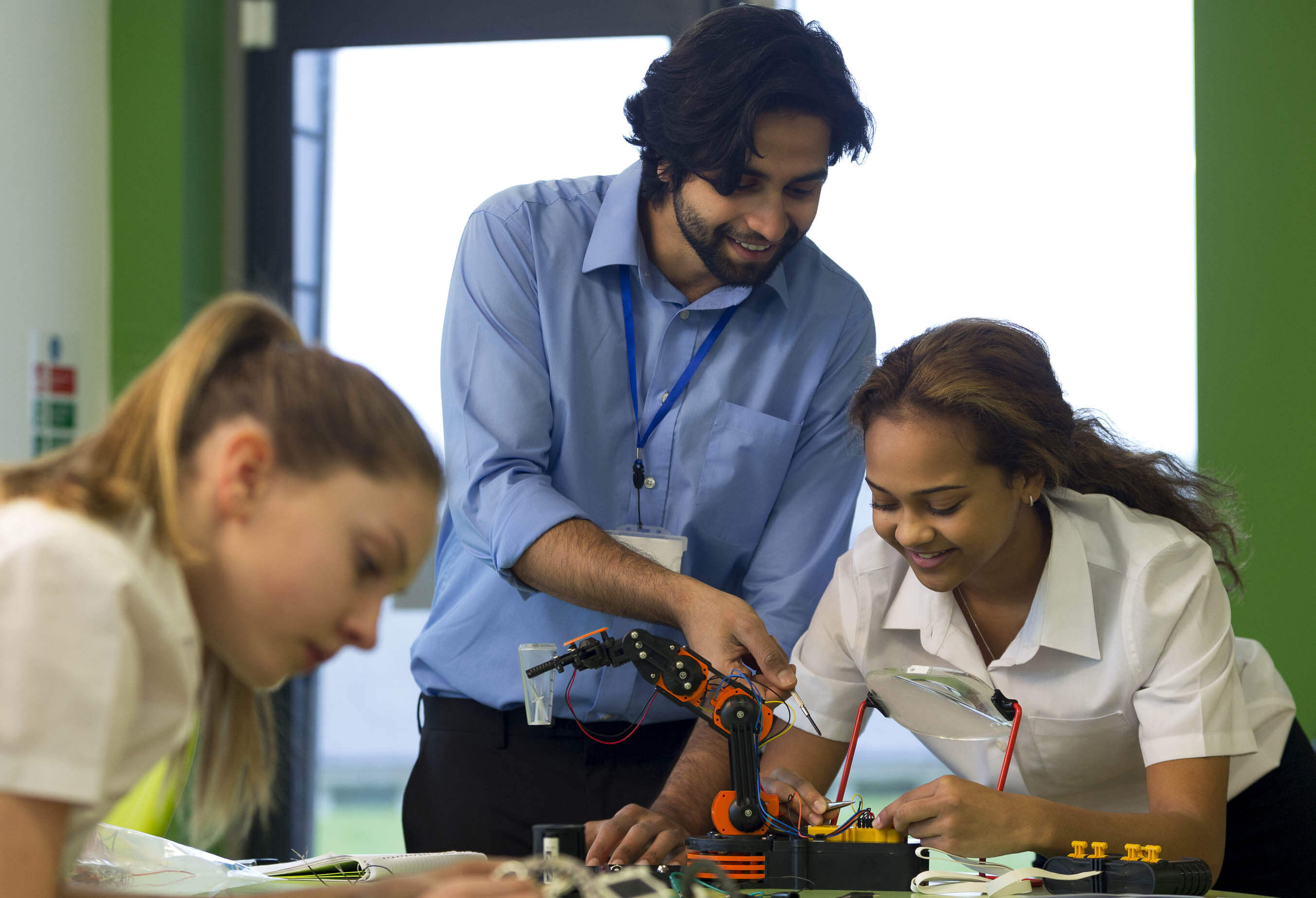Manufacturing engineering technologists work in teams to develop equipment, machines, processes, and tools to make quality products at a reasonable cost. Students in ETSU’s Bachelor of Science in Engineering Technology – Manufacturing concentration are taught about advanced machine vision systems, developing tooling for robotics, plant layout and materials handling, and more. Our students work on optimizing advanced motors concepts, CNC milling processes, ergonomics, project scheduling, quality control concepts, and other key areas in use in the manufacturing industry.
This program prepares students to enter the world of the advanced manufacturing facility; it provides the background needed to support students in the making of quality products while optimizing the approach to production. Students in the manufacturing program learn in a laboratory based environment where advanced motor test benches, CNC labs, robotic cells, and solid modeling projects are a few of the hands on lab areas students will encounter.


Concentration Overview
The Manufacturing Engineering Technology (MET) program is accredited by the Engineering Technology Accreditation Commission of ABET, https://www.abet.org, under the General Criteria.
Graduates are able to apply their knowledge and understanding to manufacturing processes, troubleshooting, problem solving, project management, and supervision to fulfill many career opportunities.
Educational Objectives
Problem Solving Skills: Graduates will be capable of employing:
Analysis and Synthesis Skills through choosing appropriate models, combining skills
from various areas, and synthesizing solutions to engineering problems both real and
modeled.
Engineering Technology Skills by selecting processes or models during product development,
applying technology properly, solving problems using commercial software applications,
and employing computer-based process design tools and techniques.
Mathematics and Science Foundation Skills by applying mathematical skills to solve
problems, understanding and utilizing scientific principles, and utilizing physics
and chemistry to model and solve problems.
Communication Skills: Graduates will demonstrate the capability to communicate via:
Graphical Communication Skills by preparing charts and graphs, translating information
into graphical formats, preparing accurate technical drawings and sketches, and developing
three dimensional models.
Group/Teamwork Skills: Graduates will demonstrate the ability to be effective team
members and leaders through displaying the capability to understand behavior types
and group dynamics; load balance in group processes; lead in group situations; and
plan, organize, and control activities.
Oral Communications Skills by preparing presentation materials, performing presentations,
critiquing other presentations, conducting group discussions, and participating in
team-based activities.
Professional Skills: In preparation for their jobs, graduates will demonstrate the
ability to select appropriate materials and processes; analyze and solve open-ended
problems; use appropriate computer modeling techniques; plan projects/experiments
to meet specific objectives; and identify and integrate necessary multi-disciplinary
resources.
Self-Actualization: Graduates will know their professional responsibilities and understand
consequences of actions; participate actively in learning; and recognize the need
to continue developing skills and knowledge.
Written Communication Skills by writing effective documents that are audience specific,
describe technical operations, and bibliographic entries while being capable of critically
evaluating technical material.
Student Outcomes
Manufacturing Engineering Technology students are expected to have demonstrated proficiency in the following areas at graduation:
An ability to apply knowledge, techniques, skills and modern tools of mathematics,
science, engineering, and technology to solve broadly-defined engineering problems
appropriate to the discipline;
An ability to apply written, oral, and graphical communication in broadly-defined
technical and non-technical environments; and an ability to identify and use appropriate
technical literature;
An ability to conduct standard tests, measurements, and experiments and to analyze
and interpret the results to improve processes;
An ability to design systems, components, or processes meeting specified needs for
broadly-defined engineering problems appropriate to the discipline; and
An ability to function effectively as a member as well as a leader on technical teams.
MET Program-Specific Curricular Requirements:
In conjunction with the Accreditation Board for Engineering and Technology (ABET), the Society of Manufacturing Engineers (SME) has established program-criteria for Manufacturing Engineering Technology (MET) programs. The MET program’s curriculum includes, but is not limited to, instruction in the following five topics:
6.a.) Capstone or integrating experience that develops and illustrates student competencies
in applying both technical and non-technical skills in successfully solving manufacturing
problems;
6.b.) Manufacturing systems, automation, and operations;
6.c.) Materials and manufacturing processes;
6.d.) Product design process, tooling, and assembly; and
6.e.) Statistics, quality and continuous improvement, and industrial organization
and management.
Program Education Objectives:
The Manufacturing Engineering Technology Concentration at East Tennessee State University (ETSU) has as its primary educational objective (PEO 1) to produce graduates that possess the technical and professional skills to have successful careers in regional, state or national industries related to their discipline.
The second program educational objective (PEO 2) is to pursue life-long learning so the MET graduates can become the technical experts, technical advisors, or technical managers in their profession.
Curriculum
To graduate from ETSU with a degree in Engineering Technology (ET) with a concentration in Manufacturing Engineering Technology, a student must complete a total of 128 hours. These hours contain:
-
General Education
- ENGL 1010 Critical Reading and Expository Writing
- ENGL 1020 Critical Thinking and Argumentation
- Oral Communication (choose 1)
- Literature (choose 1)
- Fine Arts Elective (choose 1)
- ENTC 3020 Technology & Society
- ECON 2210 Principles of Macroeconomics
- PSYC 1310 Introduction to Psychology
- HIST 2010 The United States to 1877
- HIST 2020 The United States since 1877
- MATH 1530 Probability and Statistics – Noncalculus
- PHYS 2010 General Physics I Noncalculus
- PHYS 2011 General Physics Laboratory I – Noncalculus
AND
- PHYS 2020 General Physics II – Noncalculus
- PHYS 2021 General Physics Laboratory II – Noncalculus
OR
- CHEM 1110 General Chemistry
- CHEM 1111 General Chemistry Laboratory I
- CSCI 1100 Using Information Technology
-
Technology Core Requirements
- ENTC 1510 - Student in University
- ENTC 2170 - CADD (Computer Aided Design Drafting)
- ENTC 3030 - Technical Communication
- ENTC 4017 - Industrial Supervision
- ENTC 2060 - Project Scheduling
- METC 1140 - Fundamentals of Engineering Analysis
- MATH 1910 - Calculus I
- MATH 1920 - Calculus II
-
Manufacturing Core Requirements
- ENTC 1120 - Manufacturing Processes and Specification
- ENTC 2200 - Machine Tool Technology
- ENTC 2310 - Electrical Principles
- ENTC 3710 - Manual Numerical Control Programming
- ENTC 4037 - Quality Assurance I
- ENTC 4357 - CIM Applications
- ENTC 4777 - Safety Management
-
Technical Support Core Requirements
- CSCI 1250 - Introduction to Computer Science I
Choose Physics or Chemistry lecture and lab:
- PHYS 2020 - General Physics II-Noncalculus
- PHYS 2021 - General Physics Laboratory II-Noncalculus
or
- CHEM 1120 - General Chemistry Lecture II
- CHEM 1121 - General Chemistry Laboratory II
Choose one of the following:
-
Programming and Automation
- ENTC 2320 - Electronics I
- ENTC 3370 - Electronics-Digital Circuits
- ENTC 4277 - Instrumentation and Process Control
- ENTC 4337 - Microprocessors
Choose 11 credits from below:
- CSCI 1250 - Introduction to Computer Science I
- CSCI 1800 - Visual Programming I
- CSCI 2100 - Introduction to C
- CSCI 1210 - Essentials of Web Development
- ENTC 2510 - Introduction to Robotics
- ENTC 3350 - Industrial Electronics
- ENTC 4217 - Tool Design
- ENTC 4347 - Digital Signal Processors
- ENTC 4517 - Industrial Automation and Robotics
- ENTC 4900 - Independent Study in Technology
- ENTC 4957 - Special Topics in Engineering and Technology
- ENTC 4989 - Internship/Cooperative Education
- ENTC 4999 - Internship/Cooperative Education
-
General Manufacturing
- ENTC 3010 - Statics and Strength of Materials
- ENTC 3620 - Thermal and Fluid Technologies
- ENTC 4257 - Plant Layout and Materials Handling
Choose 16 credits from below:
- ENTC 3600 - Manufacturing Technology (3 credits)
- ENTC 4227 - Engineering Economy (3 credits)
- ENTC 4237 - Ergonomics and Process Optimization (4 credits)
- ENTC 4350 - Biomedical Instrumentation I (4 credits)
- ENTC 4517 - Industrial Automation and Robotics (4 credits)
- ENTC/CSCI Electives (8 credits)
Note: ENTC/CSCI electives may be chosen from any of the specialty sequence offerings or any of the following: ENTC 4347, ENTC 4517, ENTC 4900, ENTC 4957, ENTC 4989/ENTC 4999, ENGR 1120, or CSCI 1210
Faculty

Dr. Paul Sims
Program Coordinator, Undergraduate Coordinator: Professor: Electronics and ManufacturingEngineering, Engineering Technology, Interior Architecture & Surveying
- simsj@etsu.edu
- (423) 439-7819
- 213B Wilson-Wallis Hall

Bill Hemphill
Program Coordinator Associate Professor Product Development and Industrial TechnologyEngineering, Engineering Technology, Interior Architecture & Surveying
- hemphill@etsu.edu
- (423) 767-5254
- 109B Wilson-Wallis Hall

David Zollinger
Senior Lecturer: Manufacturing and ElectronicsEngineering, Engineering Technology, Interior Architecture & Surveying
- zollinger@etsu.edu
- (423) 439-7582
- 111A Wilson-Wallis Hall
 South Dossett Drive - Closure...
South Dossett Drive - Closure...